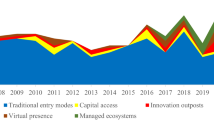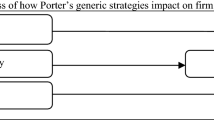Abstract
For several decades researchers have focused on the entry mode decision because it is critically important for firms expanding abroad. Despite this attention we still lack clear tools to help managers make effective entry decisions. In this paper I review past research exploring transaction cost and institutional perspectives of mode choice, provide a critique of this literature, and generate suggestions to move our knowledge forward. In addition, I review the limited research exploring entry mode performance, and emphasize the importance of examining the normative merits of proposed theoretical models. I hope these suggestions will lead to the development of prescriptive tools for managers to make better entry mode decisions that result in improved firm performance.
Similar content being viewed by others
References
Anderson, E., & Gatignon, H. 1986. Modes of foreign entry: A transaction cost analysis and propositions. Journal of International Business Studies, 17 (3): 1–26.
Berry, H., Guillen, M. F., & Zhou, N. 2010. An institutional approach to cross-national distance. Journal of International Business Studies, 41 (9): 1460–1480.
Brouthers, K. D. 2002. Institutional, cultural and transaction cost influences on entry mode choice and performance. Journal of International Business Studies, 33 (2): 203–221.
Brouthers, K. D., & Hennart, J.-F. 2007. Boundaries of the firm: Insights from international entry mode research. Journal of Management, 33 (3): 395–425.
Brouthers, K. D., & Nakos, G. 2004. SME international entry mode choice and performance: A transaction cost perspective. Entrepreneurship Theory & Practice, 28 (3): 229–247.
Brouthers, L. E., Brouthers, K. D., & Werner, S. 1999. Is Dunning's eclectic framework descriptive or normative? Journal of International Business Studies, 30 (4): 831–844.
Brouthers, K. D., Brouthers, L. E., & Werner, S. 2003. Transaction cost-enhanced entry mode choices and firm performance. Strategic Management Journal, 24 (12): 1239–1248.
Brouthers, K. D., Brouthers, L. E., & Werner, S. 2008a. Resource-based advantages in an international context. Journal of Management, 34 (2): 189–217.
Brouthers, K. D., Brouthers, L. E., & Werner, S. 2008b. Real options, international entry mode choice and performance. Journal of Management Studies, 45 (5): 936–960.
Brouthers, K. D., Mudambi, R., & Reeb, D. M. 2012. The blockbuster hypothesis: Influencing the boundaries of knowledge. Scientometrics, 90 (3): 959–982.
Busenitz, L. W., Gómez, C., & Spencer, J. W. 2000. Country institutional profiles: Unlocking entrepreneurial phenomena. Academy of Management Journal, 43 (5): 994–1003.
Cantwell, J., Dunning, J., & Lundan, S. M. 2010. An evolutionary approach to understanding international business activity: The co-evolution of MNEs and the institutional environment. Journal of International Business Studies, 41 (4): 567–586.
Chen, H., & Hu, M. Y. 2002. An analysis of determinants of entry mode and its impact on performance. International Business Review, 11 (2): 193–210.
Chen, S. F. S., & Hennart, J.-F. 2002. Japanese investors’ choice of joint ventures versus wholly-owned subsidiaries in the US: The role of market barriers and firm capabilities. Journal of International Business Studies, 33 (1): 1–18.
Delios, A., & Beamish, P. W. 1999. Ownership strategy of Japanese firms: Transactional, institutional and experience influences. Strategic Management Journal, 20 (10): 915–933.
Delios, A., & Henisz, W. J. 2000. Japanese firms’ investment strategies in emerging economies. Academy of Management Journal, 43 (3): 305–323.
Dow, D., & Ferencikova, S. 2010. More than just national cultural distance: Testing new distance scales on FDI in Slovakia. International Business Review, 19 (1): 46–58.
Dow, D., & Karunaratna, A. 2006. Developing a multidimensional instrument to measure psychic distance stimuli. Journal of International Business Studies, 37 (5): 578–602.
Estrin, S., Baghdasaryan, D., & Meyer, K. E. 2009. The impact of institutional and human resource distance on international entry strategies. Journal of Management Studies, 46 (7): 1171–1196.
Gaur, A. S., Delios, A., & Singh, K. 2007. Institutional environments, staffing strategies, and subsidiary performance. Journal of Management, 33 (4): 611–636.
Henisz, W. J. 2000. The institutional environment for economic growth. Economics and Politics, 12 (1): 1–31.
Hennart, J.-F. 1991. The transaction costs theory of joint ventures: An empirical study of Japanese subsidiaries in the United States. Management Science, 37 (4): 483–497.
Hennart, J.-F. 2009. Down with MNE-centric theories! Market entry and expansion as the bundling of MNE and local assets. Journal of International Business Studies, 40 (9): 1432–1454.
Jackson, G., & Deeg, R. 2008. Comparing capitalisms: Understanding institutional diversity and its implications for international business. Journal of International Business Studies, 39 (4): 540–561.
Kim, Y., & Gray, S. J. 2008. The impact of entry mode choice on foreign affiliate performance: The case of foreign MNEs in South Korea. Management International Review, 48 (2): 165–188.
Kogut, B., & Singh, H. 1988. The effect of national culture on the choice of entry mode. Journal of International Business Studies, 19 (3): 411–432.
Kostova, T., & Roth, K. 2002. Adoption of an organizational practice by subsidiaries of multinational corporations: Institutional and relational effects. Academy of Management Journal, 45 (1): 215–233.
Lu, J. 2002. Intra- and inter-organizational imitative behavior: Institutional influences on Japanese firms’ entry mode choice. Journal of International Business Studies, 33 (1): 19–37.
Martin, X., Salomon, R. M., & Wu, Z. 2010. The institutional determinants of agglomeration: A study in the global semiconductor industry. Industrial and Corporate Change, 19 (6): 1769–1800.
Meyer, K. E. 2001. Institutions, transaction costs and entry mode choice in Eastern Europe. Journal of International Business Studies, 32 (2): 357–367.
Meyer, K. E., & Nguyen, H. V. 2005. Foreign investment strategies and sub-national institutions in emerging markets: Evidence from Vietnam. Journal of Management Studies, 42 (1): 63–93.
Meyer, K. E., Estrin, S., Bhamik, S. K., & Peng, M. W. 2009. Institutions, resources and entry strategies in emerging economies. Strategic Management Journal, 30 (1): 61–80.
Morschett, D., Schramm-Klein, H., & Swoboda, B. 2010. Decades of research on market entry modes: What do we really know about external antecedents of entry mode choice? Journal of International Management, 16 (1): 60–77.
North, D. C. 1990. Institutions, institutional change and economic performance. Cambridge: Cambridge University Press.
Scott, W. R. 1995. Institutions and organizations. Thousand Oaks, CA: Sage.
Shaver, J. M. 1998. Accounting for endogeneity when assessing strategy performance: Does entry mode choice affect FDI survival? Management Science, 44 (4): 571–585.
Shenkar, O. 2012. Cultural distance revisited: Towards a more rigorous conceptualization and measurement of cultural differences. Journal of International Business Studies, 43 (1): 1–11.
Slangen, A. H. L., & van Tulder, R. J. M. 2009. Cultural distance, political risk, or governance quality? Towards a more accurate conceptualization and measurement of external uncertainty in foreign entry mode research. International Business Review, 18 (3): 276–291.
Tihanyi, L., Griffith, D. A., & Russell, C. J. 2005. The effect of cultural distance on entry mode choice, international diversification, and MNE performance: A meta-analysis. Journal of International Business Studies, 36 (3): 270–283.
Williamson, O.E. 1985. The economic institutions of capitalism. New York: Free Press.
Woodcock, C. P., Beamish, P. W., & Makino, S. 1994. Ownership-based entry mode strategies and international performance. Journal of International Business Studies, 25 (2): 253–273.
Xu, D., Pan, Y., & Beamish, P. W. 2004. The effect of regulative and normative distance on MNE ownership and expatriate strategies. Management International Review, 44 (3): 285–307.
Yiu, D., & Makino, S. 2002. The choice between joint venture and wholly owned subsidiary: An institutional perspective. Organization Science, 13 (6): 667–683.
Zhao, H., Luo, Y., & Suh, T. 2004. Transaction cost determinants and ownership-based entry mode choice: A meta-analytical review. Journal of International Business Studies, 35 (6): 524–544.
Acknowledgements
The author thanks John Cantwell, Myles Shaver, Xavier Martin, Jean Boddewyn, and an anonymous reviewer for helpful suggestions that have improved this paper.
Author information
Authors and Affiliations
Additional information
Accepted by John Cantwell, Editor-in-Chief, 7 July 2012. This paper was single-blind reviewed.
Rights and permissions
About this article
Cite this article
Brouthers, K. A retrospective on: Institutional, cultural and transaction cost influences on entry mode choice and performance. J Int Bus Stud 44, 14–22 (2013). https://doi.org/10.1057/jibs.2012.23
Received:
Accepted:
Published:
Issue Date:
DOI: https://doi.org/10.1057/jibs.2012.23




